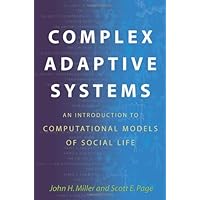
Average Reviews:

(More customer reviews)Josh Epstein's new Opus is a landmark publication in the emerging field of multiagent-based simulation of dynamic social systems. Since Josh is not only one of this still nascent (though burgeoning) field's ablest and most creative practitioners, but also among its most thoughtful critics, the reader of has two treats in store: (1) a generous, and wide-ranging, sampling of case studies (including social networks and evolution, population growth, emergence of economic classes, civil unrest, timing of retirement, the dynamics of adaptive organizations and the spread of infectious disease), and (2) a cogent "meta" discussion of what multiagent models ARE, ARE NOT and how (when their properties and limitations are *not* properly taken account of) they can easily be MISAPPLIED.
Far from suggesting that multiagent-based models are a panacea solution to all (or most) social dynamical systems, Josh's book carefully articulates the conditions for which such an approach IS (and is NOT) appropriate; an approach rarely taken by other, similar, overviews of the field. Indeed, the cogent philosophical discussion in Chapter One - alone! - in which the generativist's position is defined and put into a broader modeling/simulation context, is worth the price of admission; I have not seen a better "manifesto" of multiagent-based modeling elsewhere.
Finally, without taking away any of the inherent "beauty" (in the technical sense) of the often exaggerated concept of "emergence," Josh succeeds admirably in both defining the term, and de-mystifying it, stripping it of some of its unnecessary "quasi-mystical" baggage (at least as it is often portrayed in lay publications).
Anyone who is interested in understanding how agent models may be used to help explore the dynamics of social dynamical systems, should have this book firmly on top of their "must read" list! Josh has generously provided future generations of agent explorers their go-to source of both inspiration and ideas. Well done Josh!
Click Here to see more reviews about:
Generative Social Science: Studies in Agent-Based Computational Modeling (Princeton Studies in Complexity)Agent-based computational modeling is changing the face of social science. In Generative Social Science, Joshua Epstein argues that this powerful, novel technique permits the social sciences to meet a fundamentally new standard of explanation, in which one "grows" the phenomenon of interest in an artificial society of interacting agents: heterogeneous, boundedly rational actors, represented as mathematical or software objects. After elaborating this notion of generative explanation in a pair of overarching foundational chapters, Epstein illustrates it with examples chosen from such far-flung fields as archaeology, civil conflict, the evolution of norms, epidemiology, retirement economics, spatial games, and organizational adaptation. In elegant chapter preludes, he explains how these widely diverse modeling studies support his sweeping case for generative explanation.
This book represents a powerful consolidation of Epstein's interdisciplinary research activities in the decade since the publication of his and Robert Axtell's landmark volume, Growing Artificial Societies. Beautifully illustrated, Generative Social Science includes a CD that contains animated movies of core model runs, and programs allowing users to easily change assumptions and explore models, making it an invaluable text for courses in modeling at all levels.
 Get 29% OFF
Get 29% OFF
Click here for more information about Generative Social Science: Studies in Agent-Based Computational Modeling (Princeton Studies in Complexity)








